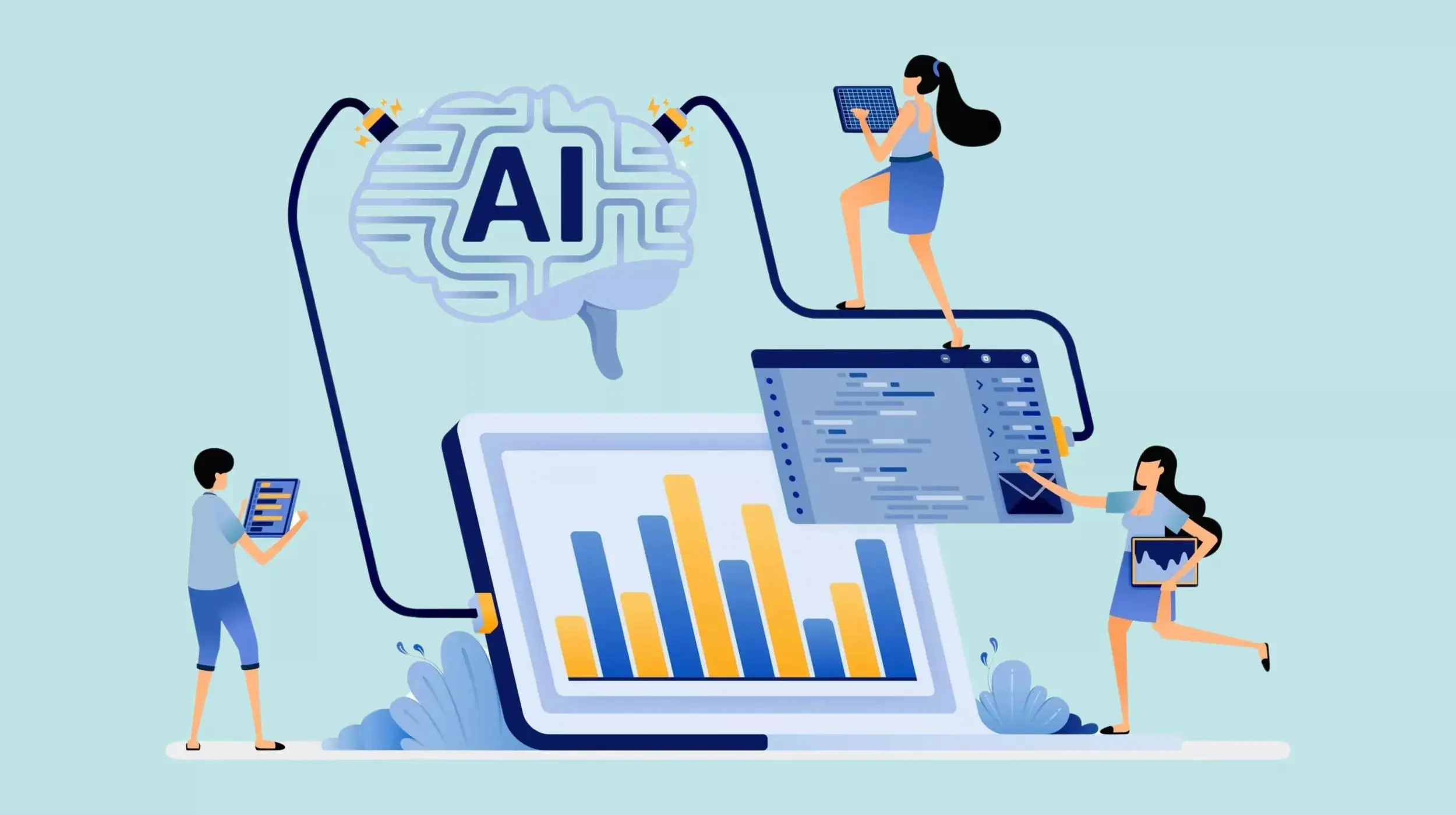Technology like artificial intelligence (AI) is changing the way companies approach marketing nowadays. Marketers are jumping on the AI-driven marketing bandwagon because it allows them to build data-driven, tailored campaigns for their business.
An overwhelming majority of 42% are still in the experimenting phase when it comes to using AI in their marketing. If you are one of them or are completely new to the AI world, but excited about using it for a robust marketing strategy, this is the beginner’s guide you need.
Understanding AI driven marketing
It is easy to understand why we should embrace artificial intelligence in our marketing efforts, but let's first understand what AI-driven marketing is and why we need to shift our focus there.
What is AI driven marketing?
AI marketing is about using artificial intelligence and machine learning to improve marketing tactics, automate operations, and analyze data. Using these tools, a marketer can quickly process massive information, see patterns, and make data-driven decisions—all without sacrificing efficiency.
AI-driven marketing mainly uses consumer data and incorporates modern tools like machine learning, reinforcement learning, natural language processing (NLP), and predictive analytics.
Talking about the results of AI in marketing, it has not only improved companies' performance but also scaled operations to meet increased demand without adding staff.
Evolution of marketing: From traditional to AI-driven
Marketing has always been an ever-changing area, which can sometimes be daunting due to the constant testing and trial required. The traditional methods of marketing have been replaced by much more modern approaches.
Commercials in newspapers and on television, as well as cold calling, were traditional marketing methods that may not be as effective in today’s fast-paced digital world.
The next logical step is the incorporation of AI, which will see the replacement of many human jobs with automated ones and data-driven decisions. Thanks to AI, companies can learn how customers behave, tailor their content to their needs, and fine-tune their marketing efforts to get better results for less money.
Companies like Amazon and Netflix have achieved many notable successes with AI. One example of data-driven decisions that use AI to provide recommendations is Amazon's recommendation engine.
Amazon generates highly relevant product recommendations by data analysis, studying consumer behavior, buying behaviors, and browsing patterns. This engages customers and encourages them to shop on Amazon again.
Core technologies behind AI driven marketing
Machine Learning, Predictive Analytics, and Natural Language Processing (NLP) are the three main technologies that fuel AI-powered marketing. Let’s get to know them in detail.
Machine learning and its role in marketing
Machine learning is a branch of artificial intelligence that enables computers to autonomously evaluate data, identify patterns, and make decisions with little human intervention. In order to make algorithms more efficient and precise over time, they are trained on large data sets.
Machine learning is extensively used in several industries, including healthcare, retail, finance, and more. It enables applications such as recommendation systems, picture and voice recognition, and more.
To better focus their effective marketing, a small Indian clothing business, for instance, can utilize machine learning to find out which saree styles are popular in places like Kolkata.
There are primarily four categories of machine learning:
Unsupervised Learning: The model has to figure out how to classify or group data without any labels to help it learn. Clustering is a typical use, such as assembling groups of clients or a target audience that exhibit similar habits.
Supervised Learning: Labeled data are used to train the model, and each case has an input-output pair. It becomes adept at translating inputs into the desired output. Some examples are mail screening and fraud detection.
Semi-Supervised Learning: In this method, a larger quantity of unlabeled data is used in conjunction with a smaller quantity of labeled data. Image or text categorization is one of the circumstances in which this is useful since tagging data may be expensive.
Reinforcement Learning: As it does tasks, the model learns by either being rewarded or penalized. Developing game AI or teaching robots are two examples of long-term decision-making activities that make use of it.
Natural Language Processing (NLP) and customer interaction
NLP stands for "Natural Language Processing". NLP allows computers to understand, interpret, and reply to human speech as it naturally occurs.
To make the internet a safer place for everyone, social media platforms like Facebook use natural language processing to identify and remove offensive material, inappropriate social media posts, and abusive comments.
Natural language processing is also the backbone of voice assistants' ability to understand and carry out user requests. This system helps in deciphering spoken language and converting it into text within which the system can operate. Your chats with Siri will seem more natural, like you're conversing with a buddy, all because of this technology.
Snapchat is also a good example that uses an NLP Intent Model for voice command detection.
One of the many uses for this technology among marketers is to facilitate communication with consumers. Artificial intelligence chatbots trained on natural language processing can provide continuous, 24/7 customer support, in contrast to human operators. In fact, 51% of customers claim that when they need quick service, they would rather interact with bots than people.
Meanwhile, it is possible to teach natural language processing algorithms to detect emotional comments in conversations using sentiment analysis by artificial intelligence. So, in the long run, this improves the company's bottom line by increasing customer satisfaction and productivity.
Predictive analytics for enhanced decision-making
Compared to more conventional approaches, AI predictive analytics can go through big amounts of data much more quickly and reveal more intricate patterns. The reason for this is that AI is capable of analyzing large datasets and continuously increasing its prediction accuracy via learning.
AI is a major priority in business strategies, according to 83% of organizations. A predictive model also provides insights from the past, not just the present, which helps companies in strategic decision-making and forecasting using these insights.
Using predictive analytics, small companies can find their clients and tailor their marketing campaigns to their specific needs. Predicting loss of clients allows them to proactively work on retention strategies.
Furthermore, small enterprises can better spend their resources thanks to predictive analytics, which reveals the highest potential for profit. If you own a raw material business, for instance, data sets can show you which items are popular and which ones are wasting money and staff.
Key benefits of AI driven marketing
1. Lesser barriers to building your online presence and start marketing your brand
Every organization has the same ambition to build a brand and make operations barrier-free. An increasing number of entrepreneurs and even complete novices are now venturing into companies thanks to AI-driven marketing, which makes it easy to establish and maintain an online presence.
Airo and similar AI-powered technologies can streamline the whole process, from choosing a domain name to having your website developed.
Businesses can develop websites that appear professional without having to know how to code with Airo's AI-powered website builder.
Related: AI guide for web design — How to create a website with AI
2. Personalization at scale
McKinsey claims that good personalization can increase sales by 5 to 15% and cut down on client acquisition expenses by 50%. It boosts customer satisfaction by presenting items or materials that the user really finds appealing.
Artificial intelligence content customization frees you from generic, one-size-fits-all messages. These days, it's possible for every piece of material to be hyper-relevant and really connect with the world of the receiver. Plus, it keeps your brand's voice and style standards intact, so everything is consistent.
That’s the strength of using AI to produce tailored versions for specific personas on a large scale.
Website pages, blog entries, sales presentations, and ad text can all be effortlessly personalized for a multitude of target personas and market trends with the use of AI-powered content customization for marketing.
3. Increased efficiency and reduced costs
When compared to humans, AI technology will always be the faster and more efficient option. AI automation systems are great at doing mundane, time-consuming jobs that humans would find tedious.
Businesses can expect a 40% boost in labor productivity and time efficiency as a result of using AI technology.
Small companies can liberate their workers to engage in higher-level, more creative endeavors by automating these manual processes. Appointment scheduling software can manage client questions automatically, while chatbots powered by AI can respond to general customer service inquiries. This not only helps you save time, but it also makes you more satisfied with your customers since you respond instantly.
Similarly, using AI technologies to assist with marketing tasks, such as keyword research, logo designing and content creation, may significantly save costs. You can get the most out of tools like GoDaddy Airo, which can help you with various marketing tools more efficiently at a fraction of the cost.
4. Data-driven insights for better strategies
The ability to make well-informed judgments is dramatically improved by data-driven insights. Many AI tools like Polymer and Salesforce can help marketers in providing trends, patterns, and other useful information.
This helps small businesses to grow at a better pace, hence they have the customer data at hand to understand their favorable market fit. Ultimately, it can improve customer service and save the expenses of trial and error.
If your budget is tight, you may have to put off plans to expand into new markets or even freeze recruiting. What AI can do in this case is let you know the exact methods that have the potential to work so that you can tap your feet in that area only, saving money and extra effort.
Applying AI to audience targeting and micro customer segmentation can also help you maximize the value of your customer experience metrics.
Implementing AI-driven marketing: A step-by-step guide
Assessing your current marketing strategy
The key to an effective AI marketing approach is setting objectives that are both specific and quantifiable. You will potentially waste time and money if you don't have clear AI marketing strategies.
To properly understand the current scenario, familiarize yourself with your business model and its existing marketing initiatives. You can't maximize your marketing efforts using AI unless you have clear goals.
You can further streamline your marketing strategy and get better results by identifying the particular tasks you would want AI technologies to manage.
For instance, for the next three months, you may aim to integrate all activities related to the customer journey and merge separate digital tools used by marketing, sales, and customer support into a single platform. These kinds of goals can give you a realistic picture of how much you can depend on AI and how much money you can put into channeling the other parts of the business.
Choosing the right AI tools and platforms
It can be quite chaotic at first to choose the right AI tools to kickstart your marketing campaign. This makes it crucial to explore all the available tools and technologies for integrating AI-driven marketing solutions.
For digital marketing - Albert.ai
Albert.ai claims to be capable of cross-channel self-optimization. Thanks to its powerful automation features, this AI marketing solution boosts the efficacy of digital ads. Search engine optimization, reporting, audience engagement and ad spend optimization are just a few of the many uses for this digital marketing tool.
For social media marketing - Loomly
You can improve your social media posting and planning with the help of Loomly, which is an effective social media marketing tool. An editorial schedule, a library of previously published works, and a feed of post ideas derived from current events and popular trends are all part of it.
Social media platforms like Facebook, Instagram, LinkedIn, and more can be easily integrated with Loomly's features.
For accurate predictions - Pecan
Managing stats from several platforms in a jumbled spreadsheet is a thing of the past. When it comes to modern marketing, AI is most useful for creating comprehensive reports that show how well campaigns are doing across all channels.
Pecan AI is a predictive analytics platform powered by artificial intelligence that allows people to make data-driven choices even if they don't have coding knowledge. Its low-code interface makes it easy to construct predictive models by providing users with helpful suggestions as they work through the platform.
For chatbots - Chatfuel
Chatfuel provides a simple drag-and-drop interface for creating a personalized virtual assistant. You can use this platform to build personalized bots that can answer basic questions or promote sales.
Chatfuel's AI is great at recognizing comments that are misspelled or grammatically wrong, which allows it to provide very useful and relevant replies.
For content generation - Jasper
Through the use of generative AI, Jasper creates a more rapid writing process. It comes with more than 80 different languages and a variety of typefaces to choose from. Additionally, Jasper is well-versed in the distinct tone and style of your company, allowing you to consistently churn out high-quality content.
For logo making - GoDaddy Airo
With GoDaddy Airo, you can have a completely professional logo in a matter of minutes that captures the essence of what makes your company unique.
For email marketing - ConvertKit
For small companies, bloggers, and artists looking to automate their email marketing, build connections with their audience, and increase conversions, ConvertKit is a valuable tool. This email campaign tool is something that every influencer, content producer, or business needs.
Note: Small companies should prioritize price, scalability, and goal alignment when selecting AI tools.
Integrating AI into your marketing workflow
All things considered, productivity, creativity, and the quality of output can be greatly enhanced by incorporating the power of AI into your marketing workflow. To truly maximize AI's potential in your marketing, keep these four key principles in mind:
Create a Plan: You have to create an all-encompassing strategy for incorporating AI into your marketing development process, making sure it ties in with your larger business goals.
Make an Investment in Team Training: AI technologies can be a responsible assistant and lighten your burden. However, you must provide your team with the knowledge to collaborate effectively with AI-driven processes by instructing them on the proper use of AI technology.
Promoting AI's Creativity: While AI is great at automating tasks, it's more important to utilize it to boost creativity so that your marketing team can concentrate on coming up with new ideas.
Review and Adjust: To keep up with the ever-changing technology and market needs, it is essential to constantly analyze how well AI technologies are working in your workflow and make any required modifications.
Challenges and considerations in AI driven marketing
Artificial intelligence (AI) based marketing isn't without its problems. Along the road, some people encounter difficulties such as:
Addressing data privacy and security concerns
Artificial intelligence systems can't do their jobs well without massive volumes of data. On the other hand, there may be serious privacy concerns with leveraging consumer data for AI development and deployment. To avoid breaking privacy rules, marketers must traverse complicated requirements.
Overcoming Integration Hurdles
It can be difficult to integrate AI with pre-existing marketing infrastructure. Companies often face challenges when trying to integrate AI technologies into their existing systems, which may cause interruptions and inefficiencies.
There is no magic bullet when it comes to integrating AI technology. It necessitates familiarity with and skill with complex integration frameworks, data models, and algorithms. To guarantee a smooth integration, businesses must either employ trained staff or team up with AI specialists.
Future trends in AI driven marketing
1. Emerging technologies and innovations
Artificial intelligence will have mastered real-time customer journey mapping by 2026, giving marketers immediate insights into consumers' interactions with their brand across many platforms.
In the future, sectors such as healthcare, logistics, and manufacturing will see more automation due to the rising proficiency of AI-powered robots in performing complicated jobs.
Once this technology reaches a certain point, it may refine AI algorithms to address more issues, boost efficiency, and provide humans with valuable research data.
Meanwhile, the cosmetics industry is pouring resources into cutting-edge innovations like 3D printing, artificial intelligence (AI), and augmented reality (AR). One such Indian brand that is using these AI tools is Nykaa, and their sales prove that customers are loving it.
2. The growing importance of ethical AI
As a major technological trend, the need for AI that is both effective and ethical is on the rise. Many companies have rushed to use AI systems like Machine Learning without fully considering the moral consequences.
Today, companies are under increasing pressure to responsibly integrate AI in today's market from values-driven customers and workers alike. Adopting moral AI techniques can win over customers who are hesitant to share personal information while simultaneously meeting regulatory requirements and safeguarding data.
Embracing AI driven marketing for business growth
The marketing sector has shown remarkable endurance and adaptation by transitioning from old methods to AI-powered ones. AI simplifies marketing processes by eliminating human mistakes, manual labor, and repetitive activities.
For businesses looking to enhance real-time client engagement and conversion rates, using AI marketing tools can revolutionize customer retention and business growth. Studying innovative analytics technologies now can help you learn a lot about customer behavior.
Given that the AI industry is predicted to expand by at least 120% annually, businesses that use AI in their marketing plans will have a major competitive advantage over their rivals.







